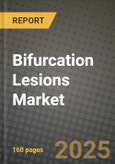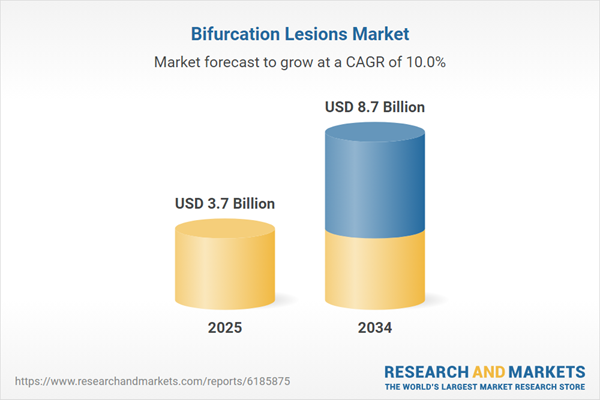The bifurcation lesions market is a specialized segment within the interventional cardiology field, focusing on the treatment of complex coronary artery disease. Bifurcation lesions occur where one artery branches into two smaller vessels, creating challenges for traditional stenting procedures due to the unique anatomy and increased risk of complications. The market addresses these challenges with innovative devices and techniques, including dedicated bifurcation stents, advanced guidewires, and specialized catheters, all designed to improve patient outcomes and procedural success rates.
In recent years, the market has witnessed significant advancements in stent design, including the development of dedicated bifurcation stents that allow for better vessel scaffolding, reduced restenosis rates, and easier access to side branches. Additionally, the introduction of bioresorbable scaffolds and drug-coated balloons has further expanded treatment options, offering alternative approaches to managing bifurcation lesions. As interventional cardiologists become more experienced with these specialized devices, procedural success rates and long-term patient outcomes have improved, driving greater adoption and market growth.
Regionally, North America and Europe lead the bifurcation lesions market due to high prevalence of coronary artery disease, advanced healthcare infrastructure, and strong investment in research and development. Asia-Pacific is rapidly emerging as a key growth region, driven by an aging population, rising cardiovascular disease rates, and increasing access to advanced medical technologies. With ongoing innovation and expanding adoption of dedicated bifurcation solutions, the market is expected to continue growing, offering improved outcomes for patients with complex coronary artery disease.
Key Insights: Bifurcation Lesions Market
- Increased use of dedicated bifurcation stents that simplify procedures and improve clinical outcomes.
- Growing adoption of drug-coated balloons and bioresorbable scaffolds for alternative treatment strategies.
- Advancements in imaging technologies, such as intravascular ultrasound (IVUS) and optical coherence tomography (OCT), enabling more precise lesion assessment and device placement.
- Rising prevalence of coronary artery disease and aging populations worldwide.
- Continued innovation in device design, offering safer and more effective treatment options for complex lesions.
- Increasing demand for minimally invasive procedures that reduce recovery times and improve quality of life.
- High procedural complexity, requiring specialized training and expertise among interventional cardiologists.
- Cost constraints in emerging markets, limiting access to advanced devices and techniques.
- Regulatory and reimbursement challenges in certain regions, impacting the adoption of new technologies.
Bifurcation Lesions Market Segmentation
By Types
- One-Stent
- Two-Stent
By Application
- Coronary Vascular
- Peripheral Vascular
Key Companies Analysed
- Wellsens Inc.
- XSENSOR Technology Corporation
- SensorCare Systems Ltd.
- Smart Caregiver Corporation
- Eight Sleep Inc.
- Infant Optics Inc.
- Lenovo Group Limited
- Koninklijke Philips N.V.
- VTech Communications Inc.
- Nanit Inc.
- iBaby Labs Inc.
- Withings Inc.
- Hisense Ltd.
- Motorola Mobility LLC
- Capsule Technologies Inc.
- Emfit Ltd.
- Hisense USA Corporation
- EarlySense Inc.
- Tekscan Inc.
- Sleep Number Corporation
- Fresenius Medical Care Holdings Inc.
- Angelcare Monitors Inc.
- Owlet Baby Care Inc.
- Samsung Electronics Co. Ltd.
- Summer Infant Inc.
- Levana LLC
- Safety 1st Inc.
- Mobi Technologies Inc.
- Graco Children's Products Inc.
- Lorex Technology Inc.
- Arlo Technologies Inc.
- Cocoon Cam Inc.
- Lollipop Baby Camera Inc.
- Cubo AI Inc.
- Snuzy Baby Inc.
- MonDevices Inc.
- Bluebell Baby Inc.
Bifurcation Lesions Market Analytics
The report employs rigorous tools, including Porter’s Five Forces, value chain mapping, and scenario-based modeling, to assess supply-demand dynamics. Cross-sector influences from parent, derived, and substitute markets are evaluated to identify risks and opportunities. Trade and pricing analytics provide an up-to-date view of international flows, including leading exporters, importers, and regional price trends.Macroeconomic indicators, policy frameworks such as carbon pricing and energy security strategies, and evolving consumer behavior are considered in forecasting scenarios. Recent deal flows, partnerships, and technology innovations are incorporated to assess their impact on future market performance.
Bifurcation Lesions Market Competitive Intelligence
The competitive landscape is mapped through proprietary frameworks, profiling leading companies with details on business models, product portfolios, financial performance, and strategic initiatives. Key developments such as mergers & acquisitions, technology collaborations, investment inflows, and regional expansions are analyzed for their competitive impact. The report also identifies emerging players and innovative startups contributing to market disruption.Regional insights highlight the most promising investment destinations, regulatory landscapes, and evolving partnerships across energy and industrial corridors.
Countries Covered
- North America - Bifurcation Lesions market data and outlook to 2034
- United States
- Canada
- Mexico
- Europe - Bifurcation Lesions market data and outlook to 2034
- Germany
- United Kingdom
- France
- Italy
- Spain
- BeNeLux
- Russia
- Sweden
- Asia-Pacific - Bifurcation Lesions market data and outlook to 2034
- China
- Japan
- India
- South Korea
- Australia
- Indonesia
- Malaysia
- Vietnam
- Middle East and Africa - Bifurcation Lesions market data and outlook to 2034
- Saudi Arabia
- South Africa
- Iran
- UAE
- Egypt
- South and Central America - Bifurcation Lesions market data and outlook to 2034
- Brazil
- Argentina
- Chile
- Peru
Research Methodology
This study combines primary inputs from industry experts across the Bifurcation Lesions value chain with secondary data from associations, government publications, trade databases, and company disclosures. Proprietary modeling techniques, including data triangulation, statistical correlation, and scenario planning, are applied to deliver reliable market sizing and forecasting.Key Questions Addressed
- What is the current and forecast market size of the Bifurcation Lesions industry at global, regional, and country levels?
- Which types, applications, and technologies present the highest growth potential?
- How are supply chains adapting to geopolitical and economic shocks?
- What role do policy frameworks, trade flows, and sustainability targets play in shaping demand?
- Who are the leading players, and how are their strategies evolving in the face of global uncertainty?
- Which regional “hotspots” and customer segments will outpace the market, and what go-to-market and partnership models best support entry and expansion?
- Where are the most investable opportunities - across technology roadmaps, sustainability-linked innovation, and M&A - and what is the best segment to invest over the next 3-5 years?
Your Key Takeaways from the Bifurcation Lesions Market Report
- Global Bifurcation Lesions market size and growth projections (CAGR), 2024-2034
- Impact of Russia-Ukraine, Israel-Palestine, and Hamas conflicts on Bifurcation Lesions trade, costs, and supply chains
- Bifurcation Lesions market size, share, and outlook across 5 regions and 27 countries, 2023-2034
- Bifurcation Lesions market size, CAGR, and market share of key products, applications, and end-user verticals, 2023-2034
- Short- and long-term Bifurcation Lesions market trends, drivers, restraints, and opportunities
- Porter’s Five Forces analysis, technological developments, and Bifurcation Lesions supply chain analysis
- Bifurcation Lesions trade analysis, Bifurcation Lesions market price analysis, and Bifurcation Lesions supply/demand dynamics
- Profiles of 5 leading companies - overview, key strategies, financials, and products
- Latest Bifurcation Lesions market news and developments
Additional Support
With the purchase of this report, you will receive:- An updated PDF report and an MS Excel data workbook containing all market tables and figures for easy analysis.
- 7-day post-sale analyst support for clarifications and in-scope supplementary data, ensuring the deliverable aligns precisely with your requirements.
- Complimentary report update to incorporate the latest available data and the impact of recent market developments.
This product will be delivered within 1-3 business days.
Table of Contents
Companies Mentioned
- Wellsens Inc.
- XSENSOR Technology Corporation
- SensorCare Systems Ltd.
- Smart Caregiver Corporation
- Eight Sleep Inc.
- Infant Optics Inc.
- Lenovo Group Limited
- Koninklijke Philips N.V.
- VTech Communications Inc.
- Nanit Inc.
- iBaby Labs Inc.
- Withings Inc.
- Hisense Ltd.
- Motorola Mobility LLC
- Capsule Technologies Inc.
- Emfit Ltd.
- Hisense USA Corporation
- EarlySense Inc.
- Tekscan Inc.
- Sleep Number Corporation
- Fresenius Medical Care Holdings Inc.
- Angelcare Monitors Inc.
- Owlet Baby Care Inc.
- Samsung Electronics Co. Ltd.
- Summer Infant Inc.
- Levana LLC
- Safety 1st Inc.
- Mobi Technologies Inc.
- Graco Children's Products Inc.
- Lorex Technology Inc.
- Arlo Technologies Inc.
- Cocoon Cam Inc.
- Lollipop Baby Camera Inc.
- Cubo AI Inc.
- Snuzy Baby Inc.
- MonDevices Inc.
- Bluebell Baby Inc.
Table Information
| Report Attribute | Details |
|---|---|
| No. of Pages | 160 |
| Published | October 2025 |
| Forecast Period | 2025 - 2034 |
| Estimated Market Value ( USD | $ 3.7 Billion |
| Forecasted Market Value ( USD | $ 8.7 Billion |
| Compound Annual Growth Rate | 9.9% |
| Regions Covered | Global |
| No. of Companies Mentioned | 37 |









